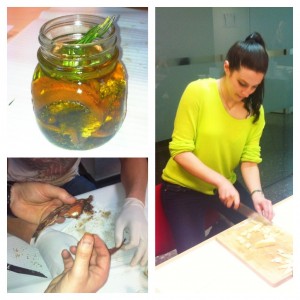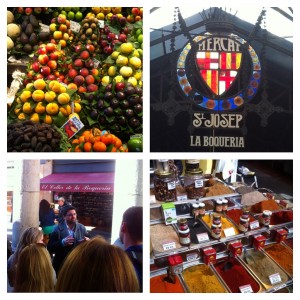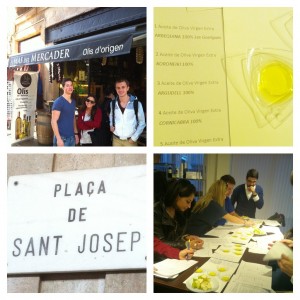Over the past two weeks students in Pep Inglés’ course ‘The Culture of Food and Wine’ have been examining the age-old processes of food preservation, examining salting, curing and smoking as well as preserving in olive oil. Last week students got to try their hand at preserving cheese and anchovies in olive oil and at the end of the semester will taste the results of their gastronomic experiment.

This week Pep’s students met at a wine and oil merchant’s shop at the legendary Boquería market to learn more about olive oils through a tasting session. Pep began with a short history of the origins of olive production, pointing out that an olive tree takes twenty-five years to yield its first olives and how its widespread cultivation was linked with periods of democracy and stability in ancient Greece. He also spoke about the health benefits of this traditional Mediterranean product rich in Omega 3, Omega 6, good cholesterol and antioxidants. Students tried different oils, including Arbequina, Koroneiki, Argudellla and Cornicabra, and learned how to describe their different tastes, drawing on the official olive oil tasting terms of the International Olive Council. By the end of the session students were comparing olive oils using such terms as buttery, floral, pungent and metallic.

As Pep reiterated throughout the session, the point of the activity was not to choose the ‘best’ olive oil, but rather to be able to explain one’s own tastes and preferences in an articulate way. Not only were students doing so, some were also enthusiastically mopping up the remaining olive oil with leftover baguette from their lunches, showing that they’ve learned to appreciate that most basic of Mediterranean indulgences – bread with olive oil! We wish to thank Pep for arranging this fun, informative field study.


This week Pep’s students met at a wine and oil merchant’s shop at the legendary Boquería market to learn more about olive oils through a tasting session. Pep began with a short history of the origins of olive production, pointing out that an olive tree takes twenty-five years to yield its first olives and how its widespread cultivation was linked with periods of democracy and stability in ancient Greece. He also spoke about the health benefits of this traditional Mediterranean product rich in Omega 3, Omega 6, good cholesterol and antioxidants. Students tried different oils, including Arbequina, Koroneiki, Argudellla and Cornicabra, and learned how to describe their different tastes, drawing on the official olive oil tasting terms of the International Olive Council. By the end of the session students were comparing olive oils using such terms as buttery, floral, pungent and metallic.

As Pep reiterated throughout the session, the point of the activity was not to choose the ‘best’ olive oil, but rather to be able to explain one’s own tastes and preferences in an articulate way. Not only were students doing so, some were also enthusiastically mopping up the remaining olive oil with leftover baguette from their lunches, showing that they’ve learned to appreciate that most basic of Mediterranean indulgences – bread with olive oil! We wish to thank Pep for arranging this fun, informative field study.











